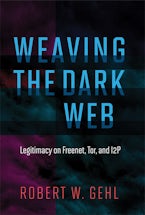| CARVIEW |
Books
Authors
On the site
- Home
- The Information Society Series
- computers
- political science
- social science
- Weaving the Dark Web

The Information Society Series
Weaving the Dark Web
Legitimacy on Freenet, Tor, and I2P
Hardcover
$30.00
Hardcover
ISBN: 9780262038263
Pub date: August 14, 2018
Publisher: The MIT Press
288 pp., 6 x 9 in,
eBook
eBook
ISBN: 9780262347594
Pub date: July 20, 2018
Publisher: The MIT Press
288 pp., 6 x 9 in,
288 pp., 6 x 9 in,
- Hardcover
- 9780262038263
- Published: August 14th, 2018
- Publisher: The MIT Press
$30.00
- eBook
- 9780262347594
- Published: July 20th, 2018
- Publisher: The MIT Press
An exploration of the Dark Web—websites accessible only with special routing software—that examines the history of three anonymizing networks, Freenet, Tor, and I2P.
The term “Dark Web” conjures up drug markets, unregulated gun sales, stolen credit cards. But, as Robert Gehl points out in Weaving the Dark Web, for each of these illegitimate uses, there are other, legitimate ones: the New York Times's anonymous whistleblowing system, for example, and the use of encryption by political dissidents. Defining the Dark Web straightforwardly as websites that can be accessed only with special routing software, and noting the frequent use of “legitimate” and its variations by users, journalists, and law enforcement to describe Dark Web practices (judging them “legit” or “sh!t”), Gehl uses the concept of legitimacy as a window into the Dark Web. He does so by examining the history of three Dark Web systems: Freenet, Tor, and I2P.
Gehl presents three distinct meanings of legitimate: legitimate force, or the state's claim to a monopoly on violence; organizational propriety; and authenticity. He explores how Freenet, Tor, and I2P grappled with these different meanings, and then discusses each form of legitimacy in detail by examining Dark Web markets, search engines, and social networking sites. Finally, taking a broader view of the Dark Web, Gehl argues for the value of anonymous political speech in a time of ubiquitous surveillance. If we shut down the Dark Web, he argues, we lose a valuable channel for dissent.
Robert W. Gehl is F. Jay Taylor Endowed Research Chair of Communication at Louisiana Tech University and the author of Weaving the Dark Web (MIT Press).
Weaving the Dark Web: Legitimacy on Freenet, Tor, and I2P presents legitimacy through thoroughly-researched and organized frames. The telling of esoteric computer science history, the use of archival text from listservs, interviews with developers and users, and concepts from varied disciplines deepen the exploration and leave the reader satiated. The chapters weave and complement each other as we struggle with legitimacy in communication and in power. ~Internet Histories: Digital Technology, Culture and Society
Here Gehl deftly navigates the ambivalent, sometimes counterintuitive ways ‘legitimacy’ is used to describe the Dark Web’s uses and meanings. This approach simultaneously illuminates the discursive contours of the Dark Web and situates it within broader conversations about the power dynamics, social formations, and political implications baked into networked technologies. ~Whitney Phillips, Assistant Professor of Communication, Culture, and Digital Technologies, Syracuse University; author of This Is Why We Can't Have Nice Things: Mapping the Relationship between Online Trolling and Mainstream Culture
Gehl treats us to a brilliant analysis of the technologies, uses, and users of the Dark Web. Replacing sensationalist myths with sensitive and profound ethnography, Weaving the Dark Web is essential reading on a sorely neglected field of Internet studies. ~Nicholas John, Senior Lecturer in the Department of Communication, The Hebrew University of Jerusalem; author of The Age of Sharing
This book is ‘legit,’ a fascinating and accomplished exploration of a sociotechnical frontier, the Dark Web. Drawing together contemporary thought and presenting new insights, this book moves our understanding of the technological practices and social milieu occupying these emergent digital spaces forward. A must-read for Internet scholars and the digitally curious. ~Alexia Maddox, Lecturer in Communications, School of Communication and Creative Arts, Deakin University (Melbourne, Australia); author of Research Methods and Global Online Communities: A Case Study




